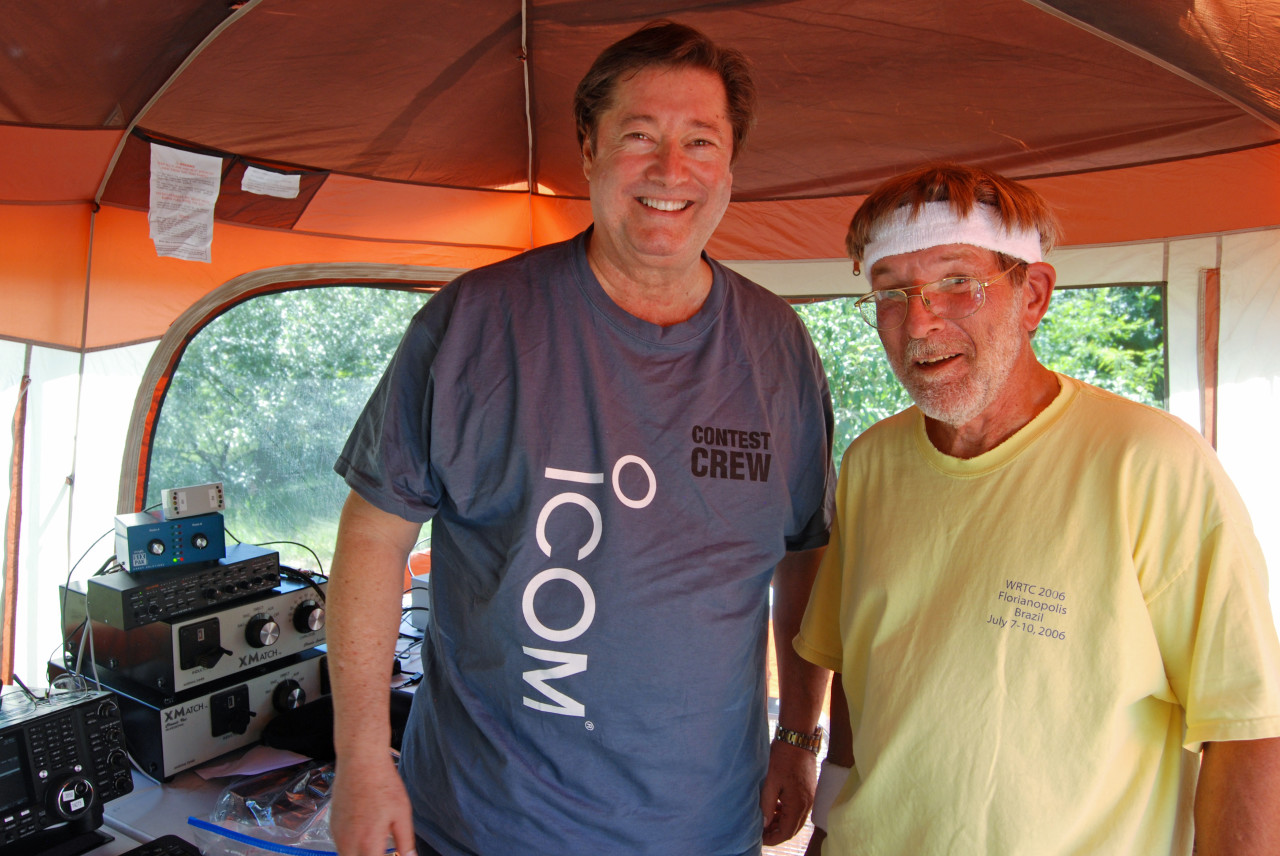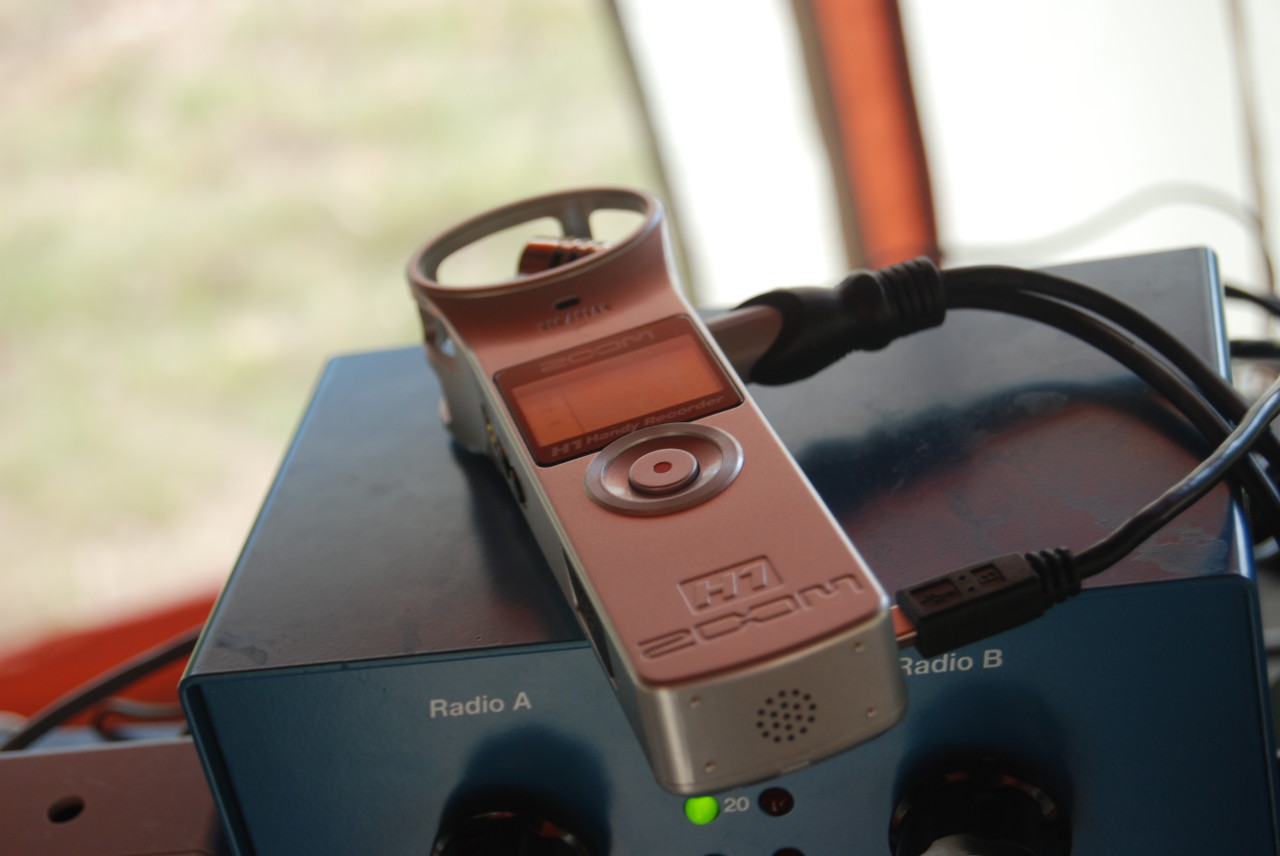Advertisement
Making Contact In The 'Olympics' Of Ham Radio
Resume
This story originally aired on Aug. 9, 2014. This week it appears again as a part of our 'Best Of' show.
Two by two, competitors representing 38 countries were called to the stage at the World Radiosport Team Championship, held in Westborough, Massachusetts. They’re not identified by their names, which nobody knows anyway, but by their call signs.
Clutching manila envelopes crammed with maps and instructions, the teams rushed out of the hotel banquet room. They’re eager to set up for what they describe as the "Olympics of ham radio.”
Organizers had already chosen the sites and raised the antennas. “It’s almost like we set the road course and now they’re bringing their cars and drivers and now they see what they can do,” said Randy Thompson, K5ZD, the co-chair of WRTC 2014.
Teams would spend the rest of the day testing their equipment. The next morning at 8 a.m. sharp, they’d boot up their systems and begin broadcasting. For 24 hours, competitors tried to contact as many different people in as many different countries as possible.
“There is no defense or offense in this particular case,” Thompson said. “You just make as big a score as you can and hope you’re better than everyone else.”

John Crovelli, W2GD, and George DeMontrond, NR5M, were testing their equipment in a tent pitched alongside a golf course in Devens, Massachusetts. DeMontrond turned on his receiver and almost immediately found a conversation originating in Russia, then one in Italy. But voice communication isn’t the contester’s bread and butter. For that, DeMontrond relies on his partner.
“Now what he does, primarily, is down here,” DeMontrond said, tuning into a conversation in Morse code.
“Music to my ears,” Crovelli responded.
Morse code was dropped for military and commercial use in the 90s. But, when there’s a lot of interference, or when too many operators are trying to use the same frequency, Morse code is easier to isolate. According to Crovelli, hams also use code to shoot the breeze.
“When we’re not in a contest or something we just have regular conversations about equipment and weather and people and just about anything,” Crovelli said. “With dits and dahs as they call them, yeah, dits and dahs.”
On the other side of the golf course, Scott Redd, K0DQ, was having considerably less success testing his equipment. But Redd knows to keep an even head.
“You can’t panic, if you panic you’d be dead,” Redd said. “It’s like in war planning, they say the first casualty of contact with the enemy is the war plan. And so we had a plan, now we’re going to find out what’s wrong and troubleshoot it.”
Redd knows a thing or two about war planning. He’s the former vice admiral of the Navy’s 5th fleet and served as the deputy administrator for the coalition provisional authority in Iraq. But he’s also won 11 world championships as a ham radio operator, and he was in the hunt for a 12th.

“All of us would like to win the gold medal, obviously,” Redd said. “If we can get the line noise down and some other things, ah, you never know. Everything’s possible.”
Back at competition headquarters, David Hodge, N6AN, and his teammate John Barcrof, K6AM, were prepared to do whatever they have to do to win.
“You don’t go to the bathroom anymore, do you?” Barcrof asked.
“Ah, yeah. I gave that up.” Hodge replied.
For all they sacrifice, contesters win little more than bragging rights.
It’s not that the organizers are cheap, Gerry Lynch, GI0RTN, of Belfast, Northern Ireland said. It has to do with the tiny bits of bandwidth set aside for ham radio operation. These bands, which Lynch describes as the National Parks of the radio spectrum, could fetch billions of dollars on the open market.
“We have use of this absolutely free, but we mustn’t make a profit,” Lynch explained. “So the only prize we are allowed is maybe a trophy or a medal or the honor, the honor among your group of peers.”
So there’s no money in this sport and no real prizes. Qualifying for this event takes four years. Competitors must pay for their own equipment and fly all around the world to learn a set of skills, such as Morse code, that have little or no application in the real world. So, why do it? Believe it or not, Lynch says, ham radio contesters are adrenaline junkies.
“You can have hundreds of stations calling you literally at once and it’s almost like a lion tamer trying to control a pack of lions.”
Gerry Lynch, ham radio competitor
During the contest, no one’s allowed in the tents other than the operators and their referee. But, all communications are recorded.
Jeffrey Briggs, VY2ZM, winner of 18 US and Canadian national championships, explained the strategy.
“We have five different frequency bands we can choose,” Briggs said. “We can chose Morse code or voice, which means there’s 10 different places we can choose to be.”
Generally speaking, certain frequencies are better at certain times of day. Find yourself in the wrong place at the wrong time, and you lose valuable contacts. But propagation can be unpredictable, and contesters face disadvantages beyond a lack of sleep.
“You have a weaker signal,” Briggs warned. “You’ve got to pick and move, you gotta dodge, you’ve got to search and pounce, zig and zag, and kinda hope you get lucky.”
Contesters all speak of the joy of meeting face-to-face with decades-long friends. They revel in the chance to show off a set of skills that might not be understood by co-workers or wives or children. But for Briggs, contests are about something far more important than all that. Contests remind him of why those very precious bits of bandwidth have survived the ever-increasing pressure for commercial use.

“In a way, this is a form of a readiness test,” he said. “It is a major event, like the Olympics, but at the same time we’re going out into tents, emergency powers, and when there is an emergency, guys like are here are the best equipped to handle it because they’ve got the sharpest skills.”
Two days after the last contact has been recorded, after judges have checked and double checked thousands of log entries, Daniel Craig, N6MJ from Southern California and Chris Hurlbut, KL9A from Bozeman, Montana stood atop the winner’s podium. It’s unlikely that in that moment they were thinking about using their lightning fast operating skills in some future emergency. For the moment, they were just taking a well-deserved bow as the best in the world at what they do.
This segment aired on August 15, 2015.
